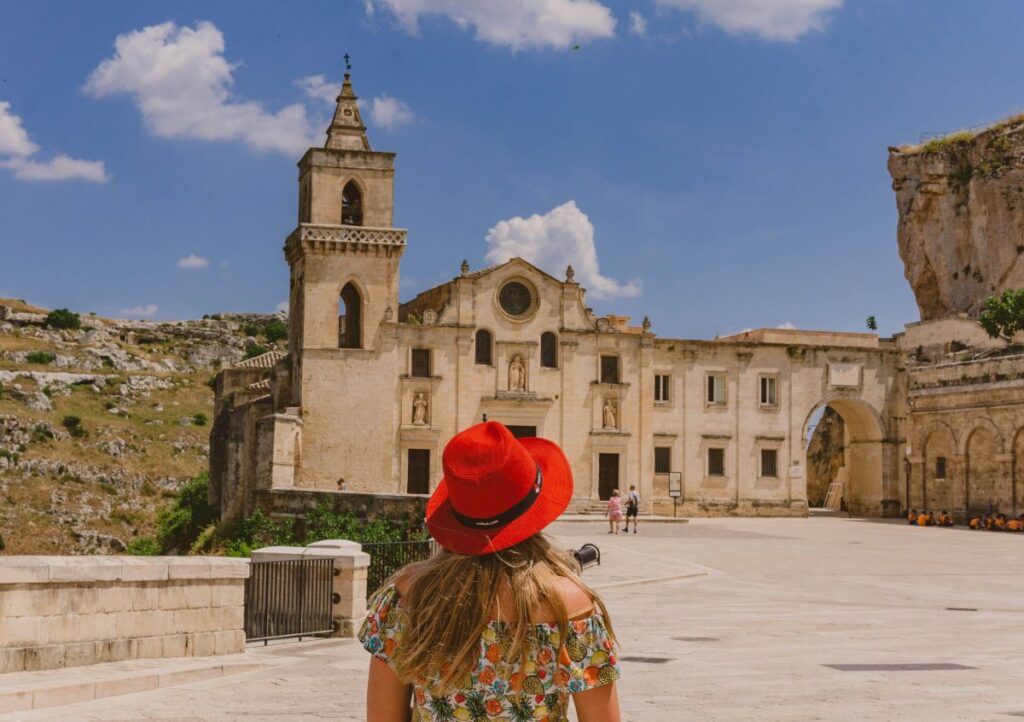
A blonde girl wearing a red a hat and flowery dress walking towards an ancient church in Italy | Photo by Andreea Petruti on Unsplash
As someone trying to understand the role of inner peace, do you think it contributes to a sustainable civilization? How does it foster harmony, empathy, and long-term collective well-being? Let’s find out!
We all know that the world is still modernizing. Given the complexity of its civilization, the importance of inner peace in achieving a long-term, sustainable civilization is more crucial than ever. As thriving individuals, we have now recognized that true sustainability cannot be achieved solely through technology or policy. It should be rooted in the psychological and spiritual well-being of the people, allowing them to contribute positively to the world. When individuals experience a genuine sense of inner calm, empathy, and a deep connection with nature, they will realize that they can also build a great community.
The concept of civilization on inner peace of rediscovering the wisdom touches the very essence of what it means to live in balance. A civilization cannot thrive if its citizens are not aligned with its principles of promoting cooperation, understanding, and mutual respect. It requires its people to have a collective sense of inner peace.
Reconnecting with Our Natural State
Chet Shupe’s Rediscovering the Wisdom of Human Nature shares that many of today’s societal issues stem from a fundamental disconnect between our natural instincts and the artificial structures of modern life. In this book, Shupe shares that the early human societies tended to be more harmonious and sustainable because they were guided by intuitive emotional intelligence rather than abstract ideologies or centralized control. He believes that healing begins by returning to this innate human wisdom.
Rediscovering the Wisdom of Human Nature serves as a call to remember who we are beneath the noise of civilization. In this book, we will learn that by observing how indigenous and ancient cultures operated, we can begin to rebuild systems that honor both the planet and human nature. The spiritual core of civilizations, as Shupe suggests, lies not in technological achievement but in emotional coherence and a profound connection with one another and the Earth.
The Inner Landscape of Sustainability
As modern people, we want a civilization that’s more than clean energy and low-carbon footprints to achieve an easy and pollution-free community. A sustainable civilization should let its people thrive emotionally, mentally, and spiritually. Here, we recognize that inner peace plays a foundational role.
When people are at peace within themselves, they are more likely to act responsibly toward others and the environment. On the contrary, factors such as stress, anger, anxiety, and unsolved trauma can lead to behavior that is reactive and short-sighted. These can directly affect the sustainability of a civilization.

We must know that our communities should possess the essential traits that build a great civilization, such as empathy, patience, and long-term thinking. These traits would always start from the homes of each family unit that creates the society. Our leaders who have achieved inner peace are less susceptible to corruption, burnout, and even ego-driven decisions. Yes, everything should start from our own actions to encourage a holistic well-being and community-centric thinking.
Building Peaceful Societies from Within
Indeed, if we want to build a peaceful community, we should start by nurturing. What we can do is provide good education for the children, as it helps create individuals who will be ready to take responsibility. Our education systems should also prioritize emotional intelligence, mindfulness, and a connection to nature. These qualities can help improve the well-being of a community.
We should also consider creating community programs, workplaces, and even urban planning to support people’s mental and emotional well-being. Additionally, what makes a community better are green spaces, access to quiet, and community rituals that foster a sense of belonging. These should help a community and its people for long-term survival.
The role of inner peace in this context is transformative. It turns citizens from passive consumers into engaged, compassionate stewards of civilization. It reduces crimes, increases civic participation, and enhances the overall quality of life. Societies rooted in peace produce less conflict and more cooperation, setting a foundation for durable and just systems that honor all life forms.
Inner Peace as a Catalyst for Global Change
When we make a decision, we should consider its effects on the future and our environment. One decision can have a profound impact on one’s family, workplace, or community. So, before we make a decision, we have to make sure that we achieve inner peace. As our decision slowly impacts the environment, we may realize that the role of inner peace can help create a great balance in society. If a good leader aligns with the right values, their decision can help promote resilience and compassion within the community.
Final Thoughts: A New Path Forward
The role of inner peace is not just a personal journey; it is a profound transformation. It is a collective imperative. By aligning our civilizations with the natural rhythms of our inner selves, we are opening the door to a more just, compassionate, and sustainable future.
Learn more about a sustainable civilization by ordering a copy of Chet Shupe’s Rediscovering the Wisdom of Human Nature.
As Chet Shupe and other thought leaders remind us, our species thrived for millennia, not because of dominance, but because of connection. It connects us with ourselves, with each other, and with the Earth. Rediscovering that wisdom may be our only hope for building civilizations that can endure.
